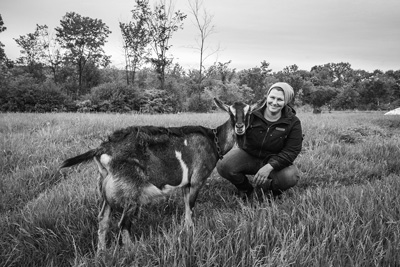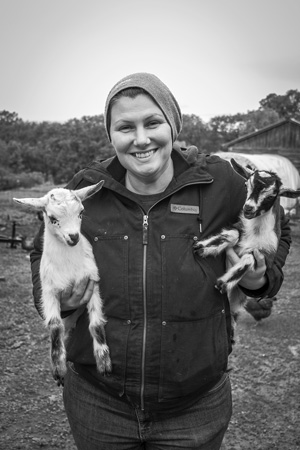News & Issues June 2018
With goats & grit
At a one-woman farm and creamery, hard work and joy
 Leah Hennessy takes time out to pet Little Sister, one of her Alpine goats, at Moxie Ridge Farm & Creamery in Argyle, N.Y. Joan K. Lentini photo
Leah Hennessy takes time out to pet Little Sister, one of her Alpine goats, at Moxie Ridge Farm & Creamery in Argyle, N.Y. Joan K. Lentini photo
By STACEY MORRIS
Contributing writer
ARGYLE, N.Y.
Leah Hennessy made her way toward the barn at Moxie Ridge Farm, expertly dodging a hissing gander whose mission was to protect his mate and baby gosling.
On a May afternoon, a cacophony of goats could be heard in the distance, and heritage hens and roosters clucked and crowed beneath the blossoming trees.
Hennessy’s 46-acre farm is home to 35 goats plus a gaggle of kids, more than 90 heritage chickens, four geese, two draft horses and a retired racehorse. This season’s litter of piglets was due to arrive at month’s end, as soon as they were weaned.
Apart from an intern and a volunteer helper, Moxie Ridge Farm & Creamery is largely a one-woman operation.
Spring, which ushers in the start of kidding season, is by far the busiest and most challenging time of year.
“My day starts at 6 a.m. and ends when it ends,” Hennessy said matter-of-factly. “On market days, it begins at 4:30 a.m.”

The goats are technically called does and bucks, but Hennessy prefers the terms billies and nannies to distinguish the sexes of her mixed herd of Alpine, Saanen and Nigerian Dwarf goats. But each of the goats has a nickname, and with the herd at three dozen and counting, recognizing them by name is no easy feat.
Stepping onto the bottom rung of the barn’s locked swinging door to check out the milking herd, Hennessy immediately registered concern as she noticed a very expectant mother-to-be lying on her side. Hennessy quickly climbed over the fence and rushed to the aid of a nanny named Twizzy.
A short time later, she slid on a latex veterinary glove and was ready for midwife duty. She’d spend the next half-hour on her knees, marching around the barn’s hay-laden floor, shadowing Twizzy’s frenetic pacing.
The pregnant goat was in obvious pain, and her cries grew louder, but Hennessy remained unrattled as she spoke softly to Twizzy while petting her back.
“The baby’s upside down, and its head is stuck behind her pelvis, so I need to help reposition it,” she explained calmly. “This time of year, I’m often literally up to my elbows in a goat.”
Two younger goats playfully butted heads in a corner of the milking barn as Hennessey alternately waited behind Twizzy and helped with the repositioning of the baby. Suddenly it all paid off, and Hennessy was on her feet, arms laden with a newborn male kid.
She determined he had aspirated during the prolonged birthing process and began to dislodge any fluid in his lungs by carefully clutching his hind legs and swinging him back and forth three times. It’s an emergency technique that requires specific training, she said.
“It looks like he’s doing OK,” she smiled, cradling the newborn in her arms. “And he’s beautiful.”
Hennessy placed the minutes-old kid in a blanketed crate while she administered electrolytes to the exhausted Twizzy. Soon, the newest member of the Moxie Ridge herd would be taken to an upper room in the barn where he’d be dried off, have birth stats recorded, and undergo umbilical disinfecting.
“Twizzy will be milked for colostrum [the first form of milk produced by the mammary glands], which is very important for babies to drink,” Hennessy explained. “The aftercare for mother and kid is an important process for both.”
She decided that because of his tawny auburn-colored coat, the newborn would be called Ruxpin, after the popular children’s toy, Teddy Ruxpin.
The delivery left Hennessy flushed and sweating, but it was just one part of her day. Her evening tasks would include milking the goats, bottle feeding the babies, and putting in some time at the creamery to be sure the wheels of feta are setting property.
Hollywood to heaven
If Hennessy’s day sounds grueling, it is. But the 37-year-old said she decided four years ago to leave behind the relative comfort of a desk job in pursuit of something that had been missing from her working life: happiness.
Her quest to get back to the land began on the opposite side of the country, amid the high-powered glitz of the entertainment industry in Los Angeles.
Hennessy was a native of the Albany area, but after graduating college she moved to the West Coast to fulfill what was then her dream of working behind-the-scenes in show business. She started from the ground up, in the mailroom of a talent agency, and rose through the ranks to become a successful junior literary agent who represented writers and directors.
Her eight-year tenure at the talent agency led to a feeling of burnout, so Hennessy tried a new direction, launching her own consulting business in the wine industry.
“I had the Hollywood hustler background and applied it to meeting wine reps,” she remembered with a laugh. “I got a taste of the lifestyle but discovered it wasn’t for me. All the things I was doing as a career looked good on paper, but I wasn’t really happy.”
Hennessy remained in the wine industry long enough for something to happen that piqued an unbeknownst passion. While visiting a coastal vineyard, she encountered a small herd of goats and fell in love with both the goats and the artisanal cheese that was crafted on the property.
A subsequent business trip to Provence, in southeastern France, sealed the deal. There, she visited a small creamery that produced chevre and other fresh goat cheeses.
“I really clicked with the woman who ran it, even though she didn’t speak English,” Hennessy recalled. “It’s also where I got my first goat kiss. … And that was it.”
Determined to explore the universe of goat farming, Hennessy moved back to the East Coast in 2014. But she didn’t tell friends and family of her intentions, “because they would think I was bananas,” she said.
Learning the trade
She landed a job as kid manager at Coach Farm in Gallatin, at the southern edge of Columbia County. The farm, which produces artisanal cheeses mainly for restaurants and specialty food stores in New York City and the Hudson Valley, has a herd of 1,000 goats.
The job required 10-hour days, paid $9 an hour and involved a 90-minute commute from the Albany area. But Hennessy says the training she received in delivering kids and nursing ill goats back to health was priceless.
“It was really important for me to know all aspects of care involved in this business,” she explained, reaching down to give a member of her Moxie Ridge herd a scratch on the neck. “Hello, Boo-Boo. … I love you.”
Suddenly she was surrounded by nearly a dozen goats, all in want of affection, and Hennessy obliged each one.
“I had no idea how much I’d end up loving all aspects of caring for goats, but I adore it,” she said.
By March of last year, Hennessy made the leap and bought her own farm. At long last, she was ready to live the dream for herself.
But the care and feeding of goats was only part of the equation. Prior to buying her farm, Hennessy worked for a time as a cheese monger at the Cheese Traveler in Albany and enlisted the help of cheese-making mentors to show her the ropes of crafting chevre, cream cheese, Bulgarian-style feta, fromage blanc, and soft cheeses encased in ash-ripened bloomy rinds.
“I tend to gravitate towards the French cheeses,” Hennessy said. “I’m not interested in making a big variety. I choose cheeses I think people would be excited about and fall in love with.”
She currently produces about 50 pounds of cheese per week; she expects that figure will increase in the future.
Keeping faith with tradition
The herd of weaned heritage piglets would arrive for the season in late May to spend the summer dining on GMO-free local grain as well as whey from the creamery.
“Whey deepens the flavor of the pork, and it’s good for them,” Hennessy explained, adding that come fall, the pigs will also graze on nuts from the hickory trees at the bottom of the property.
“I’m in love with the old ways of farming and want to revive and continue that,” Hennessy said.
In line with that philosophy, she sees to it that mechanical assistance on the farm is minimal and that the pigs, goats, chickens, geese and horses have jobs to do that revolve around their own version of foraging, grazing, or browsing for food and, in turn, replenishing the soil with fertilizer.
“It’s what they were meant to do thousands of years ago, and it’s still what they’re meant to do today,” she said. “And I make sure they all have a great life and get belly rubs when they want them. … It does make a difference in the product.”
The time and care in put into raising her animals, and the quality of the livestock’s food, reflect in Moxie Ridge Farm’s products and pricing. The farm’s bacon sells at the farmers markets for $15 a pound.
“But there will be 13 pounds total made,” Hennessy explained. “It costs a lot to raise the pigs, and this is the reality. But once you try whey-finished pork …”
Her inventory of heritage eggs and fresh cheeses is in full swing from spring through fall. In the winter, she relies on sales of heritage meats and aged cheeses for revenue.
Hennessy opts not to place her chickens under artificial lighting in the winter, so there’s a seasonal lull in egg production.
Winters allow her a bit of down time, but not much.
“The goats need nutrition year-round, and they need lots of hay, because they can’t go out on pasture,” Hennessy said. “When the girls are dry, there’s less to do, but there’s always work needed on the infrastructure.”
Farm life at Moxie Ridge is a never-ending workload that’s reflected in what Hennessy decided to call her dream farm.
“I wanted a name that was a little traditional but also represents the spit and scrap of what farming is like,” she explained.
Even on the most arduous days, however, Hennessy wouldn’t trade it for any other profession.
“I finally got the happiness I was looking for,” she said. “My hope is that as I age, the farm will grow. I don’t want it too huge, but I’d love to see it running like a really well-oiled machine. And maybe in 10 years, I can take a vacation.”
Moxie Ridge Farm’s heritage foods are sold at farmers markets in Glens Falls, Cambridge and Saratoga Springs. Visit www.moxieridgefarm.com for more information.
